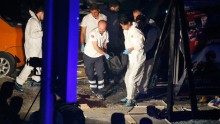Differentiating Approved Brands of Islamist Terrorists
"If the Islamic State is indeed behind this attack, this would be a declaration of war. This attack is different: the scope, impact and deaths of dozens in the heart of the country’s economic capital. It will have widespread ramifications [and Turkish President Recep Tayyip Erdogan, who has depicted himself as a strong, conservative leader] cannot afford to let this go."
"They [the Turkish government and Islamic State] went from a cold war to a limited war and are now moving towards full-scale war."
"This would represent a significant escalation by the Islamic State toward Turkey. This is a symbolic attack against the heart of Turkey."
Soner Cagaptay, director, Turkish Research Program, Washington Institute for Near East Policy
 |
| CNN -- Istanbul Airport Attack |
When Islamic State took possession of Syrian oilfields Turkey made itself equally useful as a conduit for the blackmarket fossil fuels whose sales contributed hugely to Islamic State's war chest. But even before then, Turkey viewed the rebels and the rise of the Islamic State as worthy of support in their battle against the Syrian regime. And when the Kurds in Syria and Iraq fought off the Islamic State, Turkey had its own reasons for supporting the terrorist group, in view of its ongoing PKK separatist dilemma.
He hoped that the enclave in northern Syria for the Kurds would be destroyed by the terrorist militias which had already demoralized the Syrian and Iraqi militaries to the point where they preferred to decamp rather than confront ISIL, and in the end left it to scoop up major cities and oil fields into their caliphate. President Erdogan was uneasy at the very thought of Syria's YPG Kurds establishing geographic independence, as a certain goad to the Turkish PKK agitating for a sovereign area of their own in opposition to Turkey's refusal to part with any portion of the land it clings to.
The ISIL fighters found their comfort zone in Turkey's relaxed attitude to their presence. Turkey was seen as an assured weapons route, a safe corridor for recruits and supplies aided and abetted by deliberately lax enforcement allowing the militants to establish networks within Turkey, while simultaneously establishing their caliphate across huge swaths of Iraq and Syria. Under pressure from NATO however, Turkey was forced to join the U.S.-led coalition and to allow U.S. aircraft into Incirlik Air Base.
The second shoe dropped when Turkey decided that the peace agreement with its Kurdish PKK was dispensable after the Kurdish political party gained too much influence through a popular general election vote, giving it authority and powers to confront Erdogan's Justice and Development Party, keeping it from the majority it wanted to enable Erdogan's position as president to alter the country's constitution to give the presidency greater powers and longevity in office.
Since then, there have been a number of suicide attacks in Turkey, some for which the PKK was clearly responsible; attacks on the military and police, and others the work of the Islamic State jihadists targeting crowded civilian areas for maximum death counts. The latest attack hit Istanbul's Ataturk International Airport, and the modus operandi is that of the Islamic State. Three terrorists armed with automatic rifles evaded security to shoot up the entrance to the airport before the three detonated their suicide vests.

The death toll may yet rise, but it stood at 41, with 147 people injured. Since this is Europe's third largest airport, though the bulk of the dead and injured were Turks, the international community was also hit, travelling on through Turkey into Europe. "What is noteworthy is that this attack came at a time when our country is putting up a merciless fight against separatist terrorism and recording significant success", said Turkish Prime Minister Binali Yildirim. What Syria's Assad and Turkey's Erdogan have in common is their characterization of those rebelling against them as terrorists.
Turkey is bearing the brunt of a catastrophe partly of its own making. It is an Islamist government which holds the Muslim Brotherhood in great esteem and supports the terrorist Gaza group Hamas as a legitimate political movement even as both the Brotherhood and Hamas's endgame is the destruction of the State of Israel. Which alone characterizes them through intent as terrorists, while their violent destruction aimed at the country and its Jewish population consolidates their identity as terrorists.
So Turkey identifies the Kurdish militias intent on finally establishing their own sovereign country in their heritage, indigenous geography as terrorists, while supporting violent terrorism against Israel whose continuous historical presence in the Middle East cannot be construed as other than indigenous. The logic of the Islamist mind is convoluted and unreceptive to reason, while clasping tribal and religious illogic and violent emotional and physical responses as justified.
"For the terrorist organizations, there's no difference between Istanbul and London, Ankara and Berlin, Izmir and Chicago, Antalya and Rome", said Turkey's Erdogan. And he's certainly correct in that statement. But he differentiates between terrorists, content on his belief that the terrorist Islamists whose vision he supports are not terrorists but rather conscientious Muslims whose purpose is misunderstood by the West, while those whom the West is aiding and calling rebels, are the terrorists whom Erdogan despises.
"The probability of copycat attacks goes way up high after one of those attacks. From a terrorist perspective, Brussels was a success. You can see how they would be motivated to copy that", offered Hans Weber, aviation consultant, adviser to the U.S. federal government on airport security.
Labels: Atrocities, Conflict, Islamic State, Syria, Turkey

<< Home